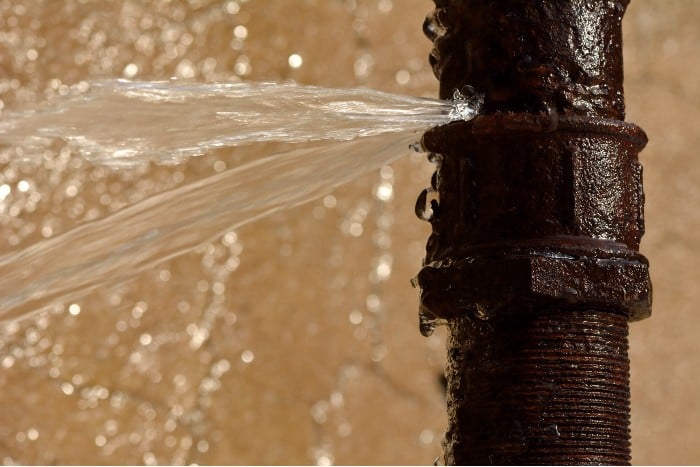Your Home's Most Frequent Leak Factors: Examination
Your Home's Most Frequent Leak Factors: Examination
Blog Article
Just about everyone may have his or her own assumption with regards to Common Water Leaks In House.

Leaks not only create waste of water yet can also cause unneeded damages to your house as well as advertise undesirable organic growth. Water leaks might go undetected given that many of the pipework in our house is concealed. By understanding and looking for day-to-day circumstances that trigger leaks, you can secure your residence from future leaks as well as unnecessary damage. Today, we will certainly consider 6 leakage creates that may be causing your pipelines to leak.
Instant temperature adjustments.
Severe temperature modifications in our pipelines can trigger them to increase and contract all of a sudden. This development and tightening might cause fractures in the pipelines, especially if the temperature level are listed below cold.
Rusty water systems
As time goes by, your plumbing system ages and also corrosion such as rust might start eating away the pipes. This could be the cause of discoloration or bending on your pipes. This calls for an inspection with your plumber promptly. Think about replacing the pipes considering that they are at a greater threat of corrosion than the newer designs if our plumbing system is old.
Malfunctioning Pipeline Joints
Pipeline joints can wear away over time, resulting in water leakages. If you have loud pipelines that make ticking or banging sounds, particularly when the hot water is turned on, your pipe joints are possibly under a lot of pressure.
Encroaching origins
The majority of water leakages start outside the house instead than inside it. You may notice wet spots or sinkholes in your lawn, and that could imply that tree roots are attacking water lines triggering water to seep out.
Poor Water Connectors
At times, a leakage can be caused by loose pipes and pipelines that provide your home appliances. In instance of a water connections leakage, you may observe water running directly from the supply line or puddles around your devices.
Clogged Drains
Clogged drains pipes might be irritating as well as inconveniencing, yet they can in some cases wind up causing an overflow causing break pipes. Maintain getting rid of any kind of materials that may decrease your drains pipes that might obstruct them to avoid such troubles.
All the above are reasons for leaks but not all water leaks result from plumbing leaks; some leaks could come from roof covering leaks. All leakages should be repaired quickly to avoid water damage.
Leaks not only trigger waste of water yet can additionally cause unnecessary damage to your house and also advertise unwanted organic development. By looking and recognizing for everyday situations that cause leaks, you can shield your residence from future leaks and unnecessary damage. Today, we will look at six leak triggers that might be creating your pipelines to leak.
At times, a leakage can be created by loosened tubes and also pipelines that provide your devices. In instance of a water links leakage, you might see water running straight from the supply line or pools around your home appliances.
How To Check For Water Leak In Your Home
How To Check for Leaks
The average household's leaks can account for nearly 10,000 gallons of water wasted every year and ten percent of homes have leaks that waste 90 gallons or more per day. Common types of leaks found in the home are worn toilet flappers, dripping faucets, and other leaking valves. These types of leaks are often easy to fix, requiring only a few tools and hardware that can pay for themselves in water savings. Fixing easily corrected household water leaks can save homeowners about 10 percent on their water bills.
To check for leaks in your home, you first need to determine whether you're wasting water and then identify the source of the leak. Here are some tips for finding leaks:
Take a look at your water usage during a colder month, such as January or February. If a family of four exceeds 12,000 gallons per month, there are serious leaks.
Check your water meter before and after a two-hour period when no water is being used. If the meter changes at all, you probably have a leak.
Identify toilet leaks by placing a drop of food coloring in the toilet tank. If any color shows up in the bowl after 10 minutes, you have a leak. (Be sure to flush immediately after the experiment to avoid staining the tank.)
Examine faucet gaskets and pipe fittings for any water on the outside of the pipe to check for surface leaks.
Undetected water leaks can happen without the home or business owner even realizing. If you suspect a water leak, but not able to find the source. It is time to contact a professional water leak detection service, The Leak Doctor.
How To Find a Water Leak In Your Home
https://www.leakdoctor.com/blog/How-To-Check-For-Water-Leak-In-Your-Home_AE197.html

We were shown that write-up on How Fast Water Damage Can Ruin Your Home from a good friend on a different web page. Enjoyed our posting? Please share it. Help someone else find it. Thanks so much for your time invested reading it.
Overflow? We're here! Report this page